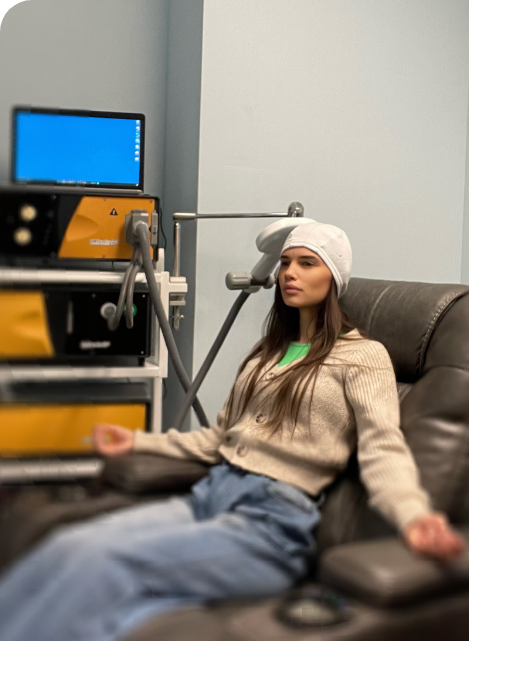If you have been told you have treatment-resistant...Read More
Transformative Care for Mind and Life
At our Village TMS office in Manhattan, we redefine trauma-focused care by merging advanced neuroscience with compassionate expertise. Transcranial Magnetic Stimulation (TMS) provides a groundbreaking, non-invasive treatment option for those affected by post-traumatic stress disorder (PTSD). Designed for patients across New York City and beyond, this safe, outpatient therapy uses targeted magnetic pulses to restore healthy brain activity disrupted by trauma. No anesthesia. No recovery time. Just evidence-based healing.
TMS therapy is FDA-approved for depression and has shown promising results for the treatment of PTSD, anxiety disorders, and other mental health conditions. It is especially effective for those who haven’t found relief with medication or exposure therapy.
By stimulating specific parts of the brain, such as the medial prefrontal cortex, repetitive transcranial magnetic stimulation (rTMS) helps regulate the fear response, lessen intrusive thoughts, and promote emotional stability. In recent clinical trials, participants experienced significant improvement in both depressive symptoms and trauma-related distress.


Each session uses a magnetic coil to deliver painless, high-frequency pulses or theta burst stimulation (TBS) to targeted brain areas. These pulses reactivate neural networks that have become dysregulated after a traumatic event. The process, called intermittent theta burst stimulation (iTBS), lasts only minutes but promotes long-term healing by strengthening cortical excitability and long-term potentiation. Using advanced mapping, our team ensures stimulation accuracy while minimizing scalp discomfort and optimizing treatment response.
Get help with depression today! It’s important to know that you are not alone.
Over the past decade, systematic reviews and randomized controlled trials conducted in the United States and abroad have confirmed the efficacy of TMS in trauma care.
In included studies, Deep TMS and low-frequency stimulation both demonstrated a positive effect in reducing hyperarousal and emotional distress. The Drug Administration and American Psychiatric Association continue to recognize repetitive transcranial magnetic stimulation as a promising alternative treatment for PTSD and related psychiatric disorders.
Session Experience: Relax in a cozy chair while the device emits a light tapping sensation.Each appointment lasts about 20 minutes, allowing you to relax while the therapy engages specific nerve cells in the medial prefrontal cortex.
Treatment Schedule: A typical treatment session involves 5 weekly sessions over 4-6 weeks, with many noticing brighter moods and renewed energy by week 3.
Long-Term Benefits: Most individuals maintain a significant reduction in depression symptoms and anxiety for a year or longer, with optional maintenance sessions available.
Our New York City clinicians follow strict safety of transcranial magnetic stimulation guidelines established by leading research bodies. Each patient is thoroughly screened for inclusion criteria, including seizure history or metal implants. Throughout the process, your care team monitors every pulse frequency and ensures maximum comfort and safety.
While widely known for major depression, repetitive transcranial magnetic stimulation also supports recovery for PTSD patients, bipolar disorder, anxiety disorders, and other mental disorders.
It’s especially beneficial for those recovering from traumatic experiences, such as combat veterans or survivors of natural disasters. Ongoing pilot studies suggest that Deep TMS may further enhance the effect of TMS on mood regulation, especially in those with treatment-resistant depression or comorbid substance use disorder.
Personalized Protocols: Our clinicians design individualized treatment plans using high-frequency stimulation, theta burst, and low-frequency settings to match each patient’s clinical profile.
Expert Collaboration: We integrate cognitive behavioral therapy, cognitive processing therapy, or eye movement desensitization when appropriate.

Evidence-Based Expertise: Our New York practice actively participates in systematic reviews and randomized trials examining the efficacy of TMS and treatment response in PTSD care.
Comprehensive Treatment: Village TMS uses both high-frequency stimulation and intermittent theta burst stimulation protocols validated by recent clinical trials to ensure measurable recovery outcomes.
Begin Your Revival Today
Starting is simple: Schedule a free consultation to explore if TMS for PTSD aligns with your goals. We’ll review your history, answer questions, and craft a roadmap to resilience.
Rediscover joy, energy, and clarity—let TMS illuminate your path to wellness.
Patient-Centric Focus: Emphasizes comfort, convenience, and long-term wellness.
Expanded Conditions: Highlights TMS for OCD, PTSD, and chronic pain.
Success Metrics: Integrates data on improvement rates and longevity of results.
Safety Reassurance: Details protocols and side effect management.
Financial Clarity: Addresses insurance and support options.
Unique Clinic Value: Showcases personalized technology and holistic care.
This rewrite offers a fresh narrative, deeper insights, and answers to unspoken patient questions while maintaining an uplifting, empowering tone.
If you have been told you have treatment-resistant...Read More
If you have tried antidepressants, adjusted the dosage,...Read More
If you are exploring Transcranial Magnetic Stimulation as...Read More
Finding reliable TMS providers near me is no...Read More
Living with attention challenges affects more than focus....Read More
When you type “TMS near me” into Google,...Read More
Take this next step, we’ll help with the others.
We proudly serve patients throughout:
Manhattan: Union Square, Chelsea, Flatiron, Greenwich Village, West Village, East Village, Midtown, Upper East Side, Upper West Side, Harlem, Tribeca, SoHo
Brooklyn & Queens: Brooklyn Heights, Williamsburg, Park Slope, Long Island City, Astoria, Forest Hills
New Jersey: Hoboken, Jersey City, Weehawken, West New York, North Bergen, Fort Lee, Edgewater, Secaucus, Newark, and surrounding South Bergen communities
If you’re searching for TMS therapy near Manhattan, Brooklyn, Queens, or Hoboken, our centrally located NYC office makes treatment convenient and accessible.
TMS for PTSD uses repetitive transcranial magnetic stimulation to rewire neural networks associated with fear and trauma. Theta burst stimulation enhances cortical excitability, helping restore emotional control and resilience.
Yes. TMS is a non-invasive brain stimulation method with a strong safety record. Sham treatment and clinical trials consistently show no major risks, and side effects like mild scalp discomfort fade quickly.
Most patients experience significant improvement within two to four weeks. Continued sessions can yield a significant difference in focus, mood, and sleep quality.
Absolutely. Deep transcranial magnetic stimulation has shown success among combat veterans and individuals who’ve experienced trauma from natural disasters or violence.
Many insurance plans recognize the benefits of TMS for depression and PTSD. Our team can verify coverage and discuss affordable options during your consultation.
We use cookies to improve your experience on our site. By using our site, you consent to cookies.
Manage your cookie preferences below:
Essential cookies enable basic functions and are necessary for the proper function of the website.
These cookies are needed for adding comments on this website.
Google reCAPTCHA helps protect websites from spam and abuse by verifying user interactions through challenges.
Google Tag Manager simplifies the management of marketing tags on your website without code changes.
You can find more information in our Cookie Policy and Privacy Policy.